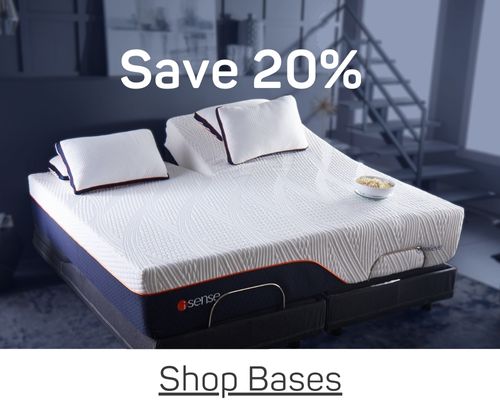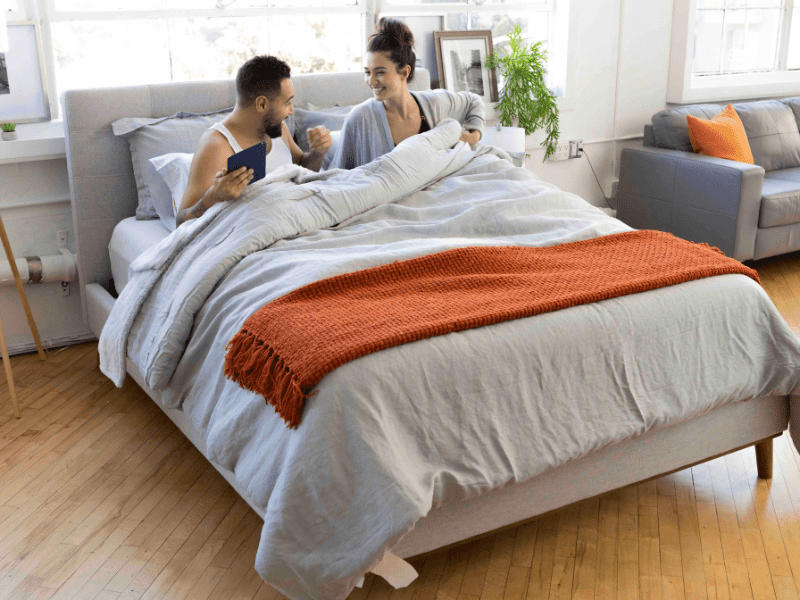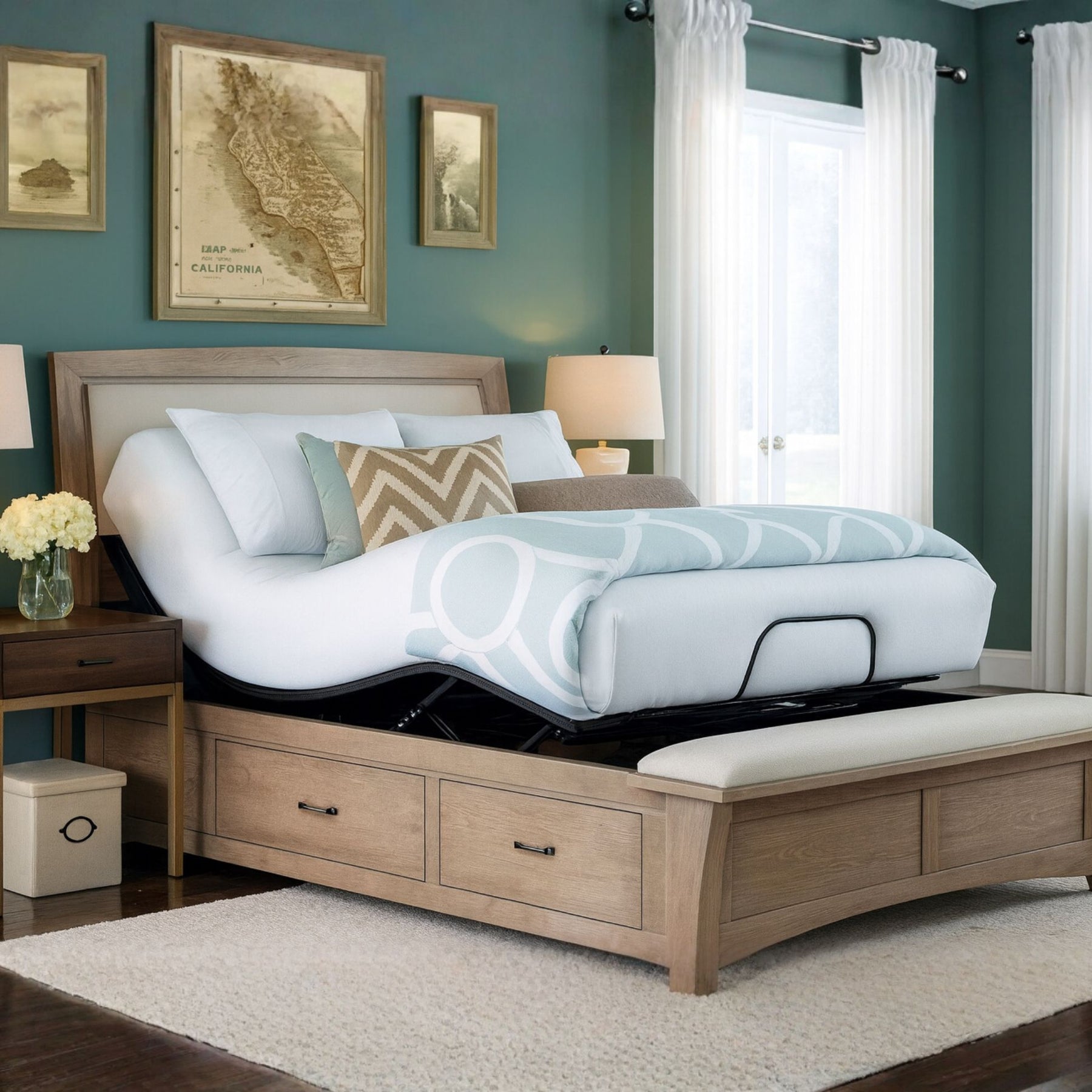Are you struggling to achieve a restful night's sleep and wondering if technology could provide the solution? You're not alone; the rapid advancement of sleep-monitoring technologies is revolutionizing our approach to achieving better sleep health.
In this article, we will journey through the latest innovations in sleep tech, from wearable trackers to AI-powered mattresses that offer a highly personalized sleeping experience.
Get ready - your dream of a perfect night's sleep might be closer than you think with isense!
The Growing Need for Sleep Technology
People all over the world are having a hard time sleeping. Bad sleep hurts their health and mood. Sleep tech may be the answer to this big problem. More people want help from sleep tracking devices and sleep monitoring technology.
Sleep tech can look at your sleep data. It checks how well you rest every night. This is vital for good health and long life. Many people want more info on their sleep habits so they can make changes that lead to better nights of rest.
There's also interest in new ways to use this data for public health research. Knowing more about our sleep might show us how it affects our bodies and minds. In short, we need to pay attention to our rest now more than ever! Better tools, like advanced sensors, can help everyone get a good night's rest they deserve!
Advancements in Adaptive Bedding
Adaptive bedding is revolutionizing the way we sleep by offering personalized sleep experiences and ambient control for better rest.
Personalized Sleep Experiences
Smart beds are changing the way we sleep. These beds use science and tech to make your sleep better. They use data from past sleeps to adjust for you. This is called a personalized sleep experience.
Ambient Control
Smart beds are a big part of sleep tech now. These beds use AI and the Internet of Things (IoT). With these tools, they control your sleep area. They watch how you sleep and listen for snoring sounds.
This helps make your room better for rest. You can also have a space free from other tech to get good sleep hygiene. All this is part of ambient control in bedding technology. It links to better wellbeing and could change the future of sleep medicine.
Improvements in Wearable Sleep Trackers
Wearable sleep trackers have seen significant improvements in recent years, with enhanced accuracy and integrative solutions that provide a better understanding of sleep patterns.
Enhanced Accuracy
Wearable sleep trackers have made significant advancements in enhancing accuracy when it comes to tracking sleep and detecting different sleep stages. Recent studies have shown that these devices can achieve an impressive 88% accuracy in scoring sleep epochs as actual sleep.
This means that they are able to accurately measure and monitor your sleep patterns throughout the night. Popular brands like Fitbit have even validated their capabilities in tracking different stages of sleep.
Thanks to the development of multi-modal sensors and technologies, the future of accurate sleep tracking is promising, bringing about a data-driven revolution in improving our overall sleep health.
Integrative Solutions
Wearable sleep trackers are revolutionizing how we monitor our sleep and improve its quality. These innovative devices, such as watches, jewelry, textiles, caps, and routers, offer a range of options for tracking and analyzing our sleep patterns.
With advanced sensors and technology, these integrative solutions provide personalized insights and recommendations to enhance our rest. By wearing a sleep tracker, mattress buyers can gain valuable information about their sleep habits and make informed decisions when selecting the right mattress for optimal comfort and support.
The integration of wearable sleep trackers with smart beds is paving the way for a more comprehensive approach to achieving better rest. As advancements continue in this field, we can expect even more exciting innovations that will further improve our sleep experiences.
The Impact of Artificial Intelligence and Machine Learning
Artificial intelligence and machine learning have revolutionized the sleep tech industry, enabling predictive analytics and personalized recommendations for better rest.
Predictive Analytics
Artificial intelligence and machine learning have revolutionized the field of sleep technology, particularly with their application in predictive analytics. By analyzing a person's health data, these advanced algorithms can help inform clinical care for sleep disorders and improve our understanding of them.
For example, a predictive analytics algorithm has been developed to identify hospitalized patients who do not need to be woken up overnight, providing better rest for those individuals.
Furthermore, machine learning models can use demographic information and comorbidities to predict short- and long-term sleep outcomes. This means that mattress buyers can benefit from personalized recommendations based on their unique circumstances, ultimately improving their quality of sleep.
Personalized Recommendations
AI and machine learning have revolutionized sleep technology, allowing for personalized recommendations that can enhance your rest. These advanced algorithms analyze data from wearable devices to understand your unique sleep patterns and provide tailored suggestions for improving your sleep health.
Whether it's adjusting your bedtime routine, optimizing your bedroom environment, or recommending specific products such as adaptive bedding, the best mattress with no body impression, or relaxation techniques through virtual reality, these personalized recommendations can help you achieve better rest.
By harnessing the power of AI in sleep tech, you can receive affordable and accessible guidance to optimize your sleep experience and improve the quality of your overall well-being.
Virtual & Augmented Reality for Better Sleep
Virtual and augmented reality technologies are being utilized to provide immersive relaxation experiences and access to cognitive behavioral therapy for better sleep.
Immersive Relaxation
Virtual and augmented reality technologies offer exciting possibilities for enhancing relaxation and improving sleep quality. By immersing yourself in virtual experiences that promote calmness and tranquility, you can create a conducive environment for a restful night's sleep. Research shows that when used with relaxation techniques, virtual reality can encourage better sleep and improve sleep patterns. These immersive experiences have proven effective in mental health interventions, such as managing pain and reducing stress levels.
By harnessing the power of virtual reality, you can tap into innovative methods to achieve optimal relaxation for a peaceful slumber.
Access to Cognitive Behavioral Therapy
Virtual reality technology is revolutionizing access to cognitive behavioral therapy (CBT) for insomnia, anxiety, and depression. This innovative approach brings personalized therapy right into the comfort of your own home.
With virtual reality, you can immerse yourself in a simulated environment that helps tackle sleep disorders and mental health issues. Digital Cognitive Behavioral Therapy for Insomnia (dCBT-I) has been proven effective in improving sleep-related quality of life.
By integrating CBT techniques with virtual reality experiences, individuals can receive accessible and effective treatment without barriers like limited availability of clinical expertise.
Exploring Biometric Monitoring and Sleep Genetics
Advanced sensors and genetics research are opening up new possibilities for biometric monitoring in sleep tech, allowing for more accurate data collection and personalized insights into individuals' sleep patterns and genetic predispositions.
Advanced Sensors
Sensor technology has come a long way, with advancements in miniaturization, low power consumption, cost-effectiveness, connectivity, and functionality. These improvements have paved the way for advanced biometric sensors that can monitor various aspects of your sleep.
For instance, these sensors can keep track of your brain activity, muscle activity, and even changes in your sleep position. By wearing sleep technology equipped with these advanced sensors, you can comfortably monitor the quality of your sleep over time.
It's important to note that different methods of sleep sensing may vary in accuracy when it comes to measuring specific metrics related to sleep. However, as we look towards the future of sleep tech, data collected from these advanced sensors will play a crucial role in improving our overall sleep health.
Genetics Research
Scientists are conducting genetics research to understand why some people need more sleep than others. They have discovered differences in certain genes that may explain this variation.
By studying model organisms, they are uncovering the mechanisms and pathways that regulate sleep. Researchers have also made progress in decoding the genetics of insomnia, identifying a specific gene called Pig-Q that plays a role in sleep regulation.
To further study the genetic basis of sleep, scientists induce random mutations in mice and analyze individuals with altered sleep-related traits. This research can help us better understand how our genes influence our sleep patterns, duration, quality, and even disorders like insomnia.
The Potential of Blockchain Technology in Sleep Tech
Blockchain technology has the potential to revolutionize the sleep tech industry by offering decentralized data storage and enhanced protection of user data.
Decentralized Data Storage
Blockchain technology has the potential to revolutionize sleep tech by offering decentralized data storage. This means that instead of storing information on a centralized server, data is distributed across multiple locations, making it more secure and less prone to hacking or unauthorized access.
With blockchain, your sleep data can be securely stored and accessed only by authorized individuals or organizations. This not only ensures the privacy and security of your personal information but also allows for improved access to personalized sleep solutions and better healthcare services in the field of sleep medicine.
Blockchain technology has the power to transform how we store, share, and protect our sleep-related data, leading to advancements in remote care and personalized treatments for better rest.
Protection of User Data
Blockchain technology is being explored in the field of sleep tech to protect user data and address digital identity, privacy, and security issues. With the use of blockchain, your personal information can be stored securely and privately.
This technology has the potential to greatly improve data sharing between healthcare professionals, ensuring that your sensitive information is kept confidential. By integrating blockchain with Internet of Things (IoT), the possibilities and functionality of sleep tech can also be enhanced while maintaining data protection.
Blockchain offers a promising solution for safeguarding your personal information in the ever-evolving world of sleep technology.
Conclusion
The future of sleep tech is promising, with continuous advancements in innovative technologies and treatments. From personalized sleep experiences to wearable sleep trackers and the integration of artificial intelligence, there are exciting developments on the horizon.
With these innovations, individuals can look forward to better rest and improved overall well-being. So get ready for a revolution in the way we sleep!
FAQs
1. What is sleep tech?
Sleep tech refers to the use of technology to track, monitor, and improve sleep quality.
2. How can sleep tech innovations help me get better rest?
Sleep tech innovations can provide insights into your sleep patterns and offer solutions to common sleeping problems, such as snoring or insomnia, ultimately helping you achieve better rest.
3. Are sleep tracking devices accurate?
While sleep tracking devices can provide valuable information about your sleep habits, their accuracy may vary depending on the specific device and its sensors. It's important to choose a reputable brand for more reliable results.
4. What are some examples of sleep tech innovations?
Examples of sleep tech innovations include smart mattresses that adjust firmness based on body position, wearable devices that monitor heart rate and movement during sleep, and smartphone apps with guided meditation or white noise features for relaxation.
5. Is it safe to rely on technology for better rest?
Using technology as a tool for improving rest is generally safe; however, it is important to maintain a balanced approach by also incorporating good sleeping habits like maintaining a consistent bedtime routine and creating a conducive environment for quality rest.



















